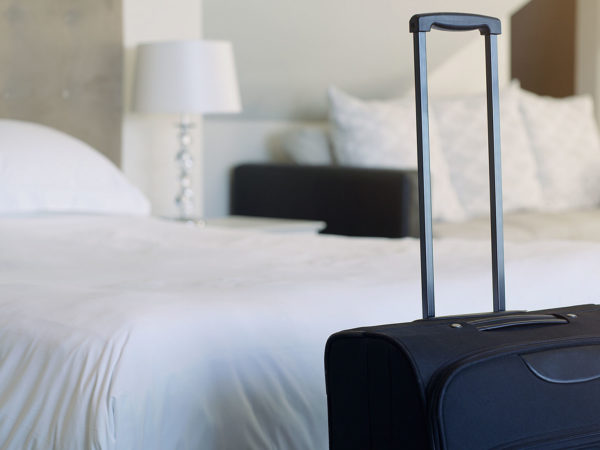Sleeping While Traveling

Whether you’re traveling for work or pleasure (or a little bit of both), we all know the effects of traveling long distances can really take a toll on our quality of sleep. But did you also know that too much travel fatigue and frequent jet lag can have long-term impacts on your overall health? So the next time you find yourself packing your bags, make sure you’ve also prepared to keep your body rested and at ease before, during, and after your trip.
Travel Fatigue vs. Jet Lag
Have you ever found yourself on a road trip wondering why your body is so exhausted? This most likely is due to travel fatigue. Travel fatigue can be caused by a number of different physical and/or mental stressors that occur while you’re traveling such as fears and anxieties around travel, motion sickness, longer periods of time seated, pressurized cabins, different schedules, diets, or weather, and many other aspects related to traveling. One of the biggest differences between travel fatigue and jet lag is that travel fatigue can happen during any mode of traveling and does not have to involve a time zone change.
Jet lag occurs when a person travels in the air across multiple time zones, which throws off their circadian rhythm. Our circadian rhythms are crucial in telling our bodies when we should and shouldn’t be at rest, so when that is thrown off by a time zone change, our bodies experience exhaustion, insomnia, disorientation, and mood swings that can oftentimes interrupt our day-to-day schedules and lives. While jet lag is a term many of us are familiar with and have even experienced, many people are unaware of its impact. While jet lag is a temporary sleep problem, its effects can become chronic if the circadian rhythm is out of sync long enough. This is most often found in regular travelers such as pilots, flight attendants, politicians, businesspeople, and athletes who are frequently traveling across time zones.
Traveling Sleep Tips
To combat the effects of travel fatigue and jet lag, it’s important to prepare and adjust before, during, and after your travels. Start by making a plan for when you can sleep and how much you’ll need to adapt:
- Before your trip, focus on getting a few nights of quality sleep so that you’re not already sleep-deprived.
- Approximately three days before your trip, start slowly adjusting your bedtime back or forward an hour at a time to adjust to a new time zone.
- If your trip is two days or less, try sticking to your normal sleep schedule as much as possible.
- If you are landing at night local time, try to avoid sleeping on the plane so that you can sleep upon arrival. If you’re arriving during the day, sleep as much as you can during the flight so that you can stay awake as long as possible.
Keep in mind the accommodations you’ll have both during your flight and during your stay. Here are a few things you may want to pack with you just in case:
- It may be helpful to bring an eye mask to help you sleep on planes or in a lighter room.
- If you’re sleeping in a place you’re unfamiliar with for an extended period of time, it may be helpful to bring your own bedding for quality, comfortable rest.
- A quality mattress and pillow protector can help you feel clean and protected on a bed that isn’t your own.
Finally, allow yourself to plan as much as possible beforehand so that you combat extra stressors and avoid additional symptoms of jet lag and travel fatigue. Here are a few additional tips that may be helpful:
- Even if your body is feeling tired, try to reduce or avoid caffeine when you travel as this can disrupt your sleep even more.
- If you’re having trouble falling asleep, a deep breathing exercise can be beneficial.
- Try to eat healthy and exercise regularly during your trip. Even though we may prefer to “treat” ourselves while traveling, a healthy diet and exercise can help make up for jet lag and travel fatigue.
- Keep checklists to reduce stress before and during your trip.
- If possible, give yourself time to recover after your trip before jumping back into your busy schedules.
Sources
“6 Tips for Better Sleep When You Travel.” Johns Hopkins Medicine. hopkinsmedicine/health/wellness-and-prevention/6-tips-for-better-sleep-when-you-travel
“How to Travel the World Without Jet Lag.” National Library of Medicine. ncbi.nlm.nih/pmc/articles/PMC2829880/
“Jet Lag: Navigating Symptoms, Causes, & Prevention.” Sleep Foundation. sleepfoundation/travel-and-sleep/jet-lag
“Travel and Sleep.” American Thoracic Society. thoracic/patients/patient-resources/resources/travel-and-sleep.pdf
“Travel and Sleep.” Sleep Foundation. sleepfoundation/travel-and-sleep
Today’s Health Topics
Editor's Pick
Health Focus
Ask Dr. Weil's Q&A











